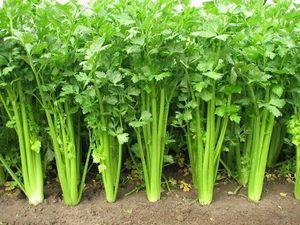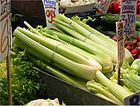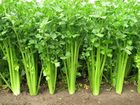Note: This is a project under development. The articles on this wiki are just being initiated and broadly incomplete. You can Help creating new pages.
Difference between revisions of "Apium graveolens - Ugragandhika, Celery"
(→External Links) |
(→Fruit) |
||
| (22 intermediate revisions by 2 users not shown) | |||
| Line 1: | Line 1: | ||
| − | |||
| − | |||
[[File:Celery.jpg|thumb|right|]] | [[File:Celery.jpg|thumb|right|]] | ||
| − | + | '''Apium graveolens var''' is a marshland plant in the family Apiaceae that has been cultivated as a vegetable since antiquity. Celery has a long fibrous stalk tapering into leaves. | |
| − | |||
==Uses== | ==Uses== | ||
| − | {{Uses| | + | {{Uses|Blood pressure}}, {{Uses|Indigestion}}, {{Uses|Uterus}}, {{Uses|Inflammatory}}, {{Uses|Hysteria}}, {{Uses|High blood pressure}}, {{Uses|Rheumatism}}, {{Uses|Diarrhea}}, {{Uses|Kidney complaints}}. |
==Parts Used== | ==Parts Used== | ||
| − | {{Parts Used|Leaves}}, {{Parts Used| | + | {{Parts Used|Leaves}}, {{Parts Used|Seeds}}. |
==Chemical Composition== | ==Chemical Composition== | ||
| − | + | Celery yields an essential oil (3%), major constituent being d-limonene (50%) and phathalides and beta-selinene; coumarins, furanocoumarins (bergapten); flavonoids (apiin and apigenin).<ref name="chemical composition"/> | |
==Common names== | ==Common names== | ||
| − | {{Common names | + | {{Common names|sa=Ugragandhika, Vastamoda, Hayagandha|hi=Bari ajmod, Ajmod|en=Celery, Wild Celery}} |
| + | |||
| + | ==Properties== | ||
| + | Reference: Dravya - Substance, Rasa - Taste, Guna - Qualities, Veerya - Potency, Vipaka - Post-digesion effect, Karma - Pharmacological activity, Prabhava - Therepeutics. | ||
| + | ===Dravya=== | ||
| + | |||
| + | ===Rasa=== | ||
| + | Katu (Pungent), Tikta (Bitter) | ||
| + | ===Guna=== | ||
| + | Laghu (Light), Ruksha (Dry) | ||
| + | ===Veerya=== | ||
| + | Ushna (Heating) | ||
| + | ===Vipaka=== | ||
| + | Katu (Pungent) | ||
| + | ===Karma=== | ||
| + | |||
| + | ===Prabhava=== | ||
==Habit== | ==Habit== | ||
| Line 28: | Line 41: | ||
===Fruit=== | ===Fruit=== | ||
| − | {{Fruit| | + | {{Fruit|Rounded|4-10cm long||With hooked hairs|Single}} |
===Other features=== | ===Other features=== | ||
==List of Ayurvedic medicine in which the herb is used== | ==List of Ayurvedic medicine in which the herb is used== | ||
| − | |||
==Where to get the saplings== | ==Where to get the saplings== | ||
| Line 43: | Line 55: | ||
==Commonly seen growing in areas== | ==Commonly seen growing in areas== | ||
| − | {{Commonly seen| | + | {{Commonly seen|Wild in Europe}}, {{Commonly seen|Mediterranean region}}, {{Commonly seen|Himalayas}}. |
==Photo Gallery== | ==Photo Gallery== | ||
<gallery class="left" caption="" widths="140px" heights="140px"> | <gallery class="left" caption="" widths="140px" heights="140px"> | ||
| − | + | Au marché - poireaux, céleri.JPG|Ready stems for use | |
| − | + | Bleekselderij groen (Apium graveolens var. dulce green).jpg|Stem | |
| − | + | Celery from lalbagh 2286.JPG|Feild | |
| − | Au marché - poireaux, céleri.JPG | + | Celery.jpg|Leaves |
| − | + | CSIRO ScienceImage 2813 Celery.jpg|Cuttings | |
| − | + | File:Apium graveolens 003.JPG|Flowers | |
| − | Bleekselderij groen (Apium graveolens var. dulce green).jpg | + | File:Celery seed.jpg|Seeds |
| − | |||
| − | |||
| − | |||
| − | |||
| − | |||
| − | Celery from lalbagh 2286.JPG | ||
| − | |||
| − | |||
| − | Celery | ||
| − | |||
| − | |||
| − | |||
| − | |||
| − | |||
| − | Celery.jpg | ||
| − | |||
| − | |||
| − | |||
| − | |||
</gallery> | </gallery> | ||
==References== | ==References== | ||
| − | |||
<references> | <references> | ||
| − | <ref name="chemical composition">[ | + | <ref name="chemical composition">[http://gbpihedenvis.nic.in/PDFs/Glossary_Medicinal_Plants_Springer.pdf Pharmacology]</ref> |
| − | <ref name="Leaf">[https://en.wikipedia.org/wiki/Celery | + | <ref name="Leaf">[https://en.wikipedia.org/wiki/Celery Plant description]</ref> |
| − | <ref name="How to plant/cultivate">[https://www.pfaf.org/User/Plant.aspx?LatinName=Apium+graveolens+secalinum | + | <ref name="How to plant/cultivate">[https://www.pfaf.org/User/Plant.aspx?LatinName=Apium+graveolens+secalinum Cultivation details]</ref> |
</references> | </references> | ||
==External Links== | ==External Links== | ||
| − | * [https://www.botanical-online.com/english/celery-cultivation.htm | + | * [https://www.botanical-online.com/english/celery-cultivation.htm Celery cultivation details] |
| − | * [https://www.nicholsgardennursery.com/store/avactis-images/u/Celery.pdf | + | * [https://www.nicholsgardennursery.com/store/avactis-images/u/Celery.pdf Celery on nichols garden nursary] |
| − | * [https://www.growveg.com/guides/growing-celery-two-ways/ | + | * [https://www.growveg.com/guides/growing-celery-two-ways/ Celery-growing ways] |
[[Category:Herbs]] | [[Category:Herbs]] | ||
| + | [[Category:Apiaceae]] | ||
Latest revision as of 15:54, 22 January 2020
Apium graveolens var is a marshland plant in the family Apiaceae that has been cultivated as a vegetable since antiquity. Celery has a long fibrous stalk tapering into leaves.
Contents
- 1 Uses
- 2 Parts Used
- 3 Chemical Composition
- 4 Common names
- 5 Properties
- 6 Habit
- 7 Identification
- 8 List of Ayurvedic medicine in which the herb is used
- 9 Where to get the saplings
- 10 Mode of Propagation
- 11 How to plant/cultivate
- 12 Commonly seen growing in areas
- 13 Photo Gallery
- 14 References
- 15 External Links
Uses
Blood pressure, Indigestion, Uterus, Inflammatory, Hysteria, High blood pressure, Rheumatism, Diarrhea, Kidney complaints.
Parts Used
Chemical Composition
Celery yields an essential oil (3%), major constituent being d-limonene (50%) and phathalides and beta-selinene; coumarins, furanocoumarins (bergapten); flavonoids (apiin and apigenin).[1]
Common names
| Language | Common name |
|---|---|
| Kannada | NA |
| Hindi | Bari ajmod, Ajmod |
| Malayalam | NA |
| Tamil | NA |
| Telugu | NA |
| Marathi | NA |
| Gujarathi | NA |
| Punjabi | NA |
| Kashmiri | NA |
| Sanskrit | Ugragandhika, Vastamoda, Hayagandha |
| English | Celery, Wild Celery |
Properties
Reference: Dravya - Substance, Rasa - Taste, Guna - Qualities, Veerya - Potency, Vipaka - Post-digesion effect, Karma - Pharmacological activity, Prabhava - Therepeutics.
Dravya
Rasa
Katu (Pungent), Tikta (Bitter)
Guna
Laghu (Light), Ruksha (Dry)
Veerya
Ushna (Heating)
Vipaka
Katu (Pungent)
Karma
Prabhava
Habit
Identification
Leaf
| Kind | Shape | Feature |
|---|---|---|
| Simple | Celery leaves are frequently used in cooking to add a mild spicy flavor to foods, similar to, but milder than black pepper |
Flower
| Type | Size | Color and composition | Stamen | More information |
|---|---|---|---|---|
| Unisexual | 1-3cm long | Yellow | 5 | Flowers Season is June - August |
Fruit
| Type | Size | Mass | Appearance | Seeds | More information |
|---|---|---|---|---|---|
| Rounded | 4-10cm long | With hooked hairs | Single | {{{6}}} |
Other features
List of Ayurvedic medicine in which the herb is used
Where to get the saplings
Mode of Propagation
How to plant/cultivate
Prefers a rich light moist soil with some shade in summer[3]
Commonly seen growing in areas
Wild in Europe, Mediterranean region, Himalayas.
Photo Gallery
References
External Links
- Ayurvedic Herbs known to be helpful to treat Blood pressure
- Ayurvedic Herbs known to be helpful to treat Indigestion
- Ayurvedic Herbs known to be helpful to treat Uterus
- Ayurvedic Herbs known to be helpful to treat Inflammatory
- Ayurvedic Herbs known to be helpful to treat Hysteria
- Ayurvedic Herbs known to be helpful to treat High blood pressure
- Ayurvedic Herbs known to be helpful to treat Rheumatism
- Ayurvedic Herbs known to be helpful to treat Diarrhea
- Ayurvedic Herbs known to be helpful to treat Kidney complaints
- Herbs with Leaves used in medicine
- Herbs with Seeds used in medicine
- Herbs with common name in Hindi
- Herbs with common name in Sanskrit
- Herbs with common name in English
- Habit - Biennial herb
- Index of Plants which can be propagated by Seeds
- Herbs that are commonly seen in the region of Wild in Europe
- Herbs that are commonly seen in the region of Mediterranean region
- Herbs that are commonly seen in the region of Himalayas
- Herbs
- Apiaceae







